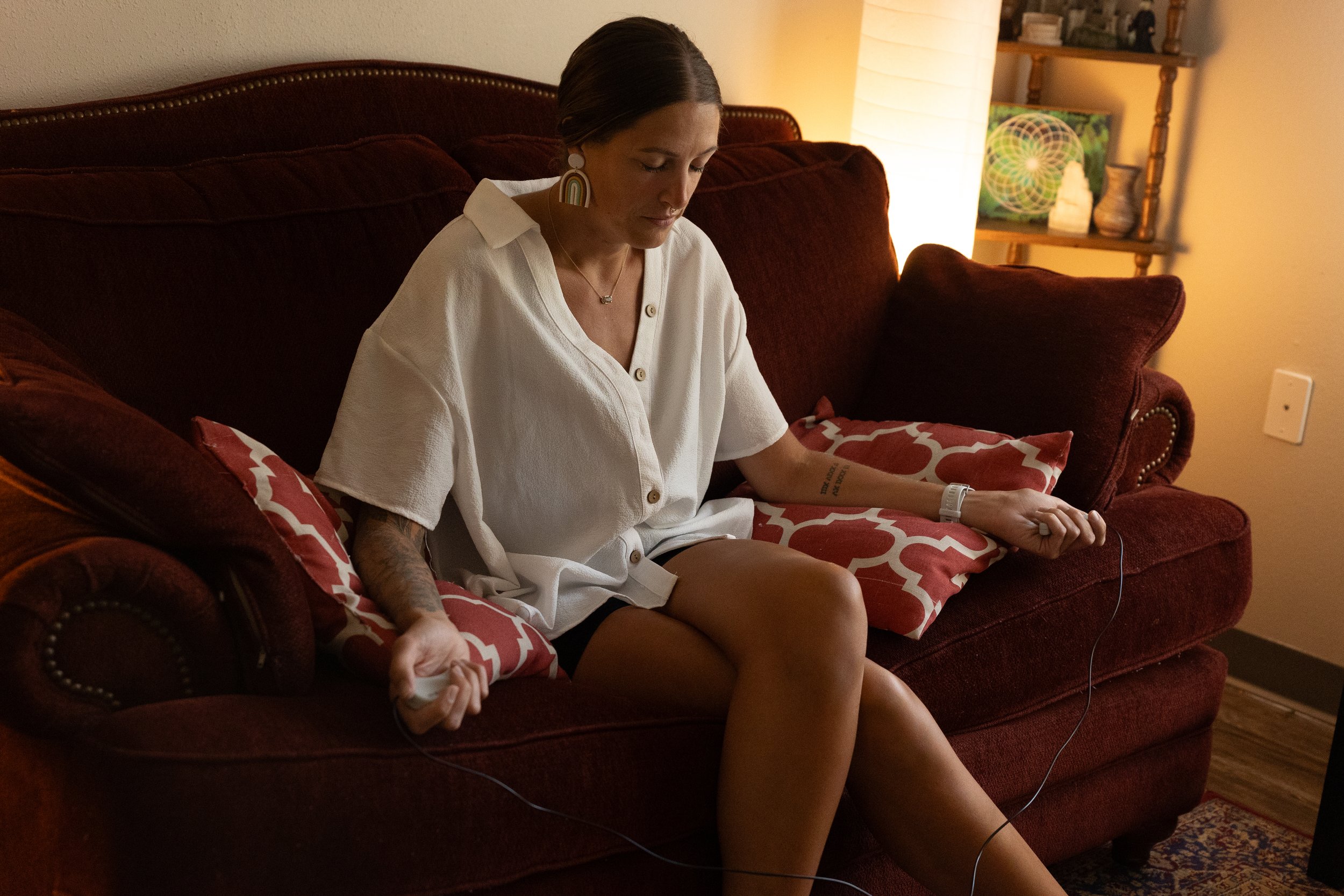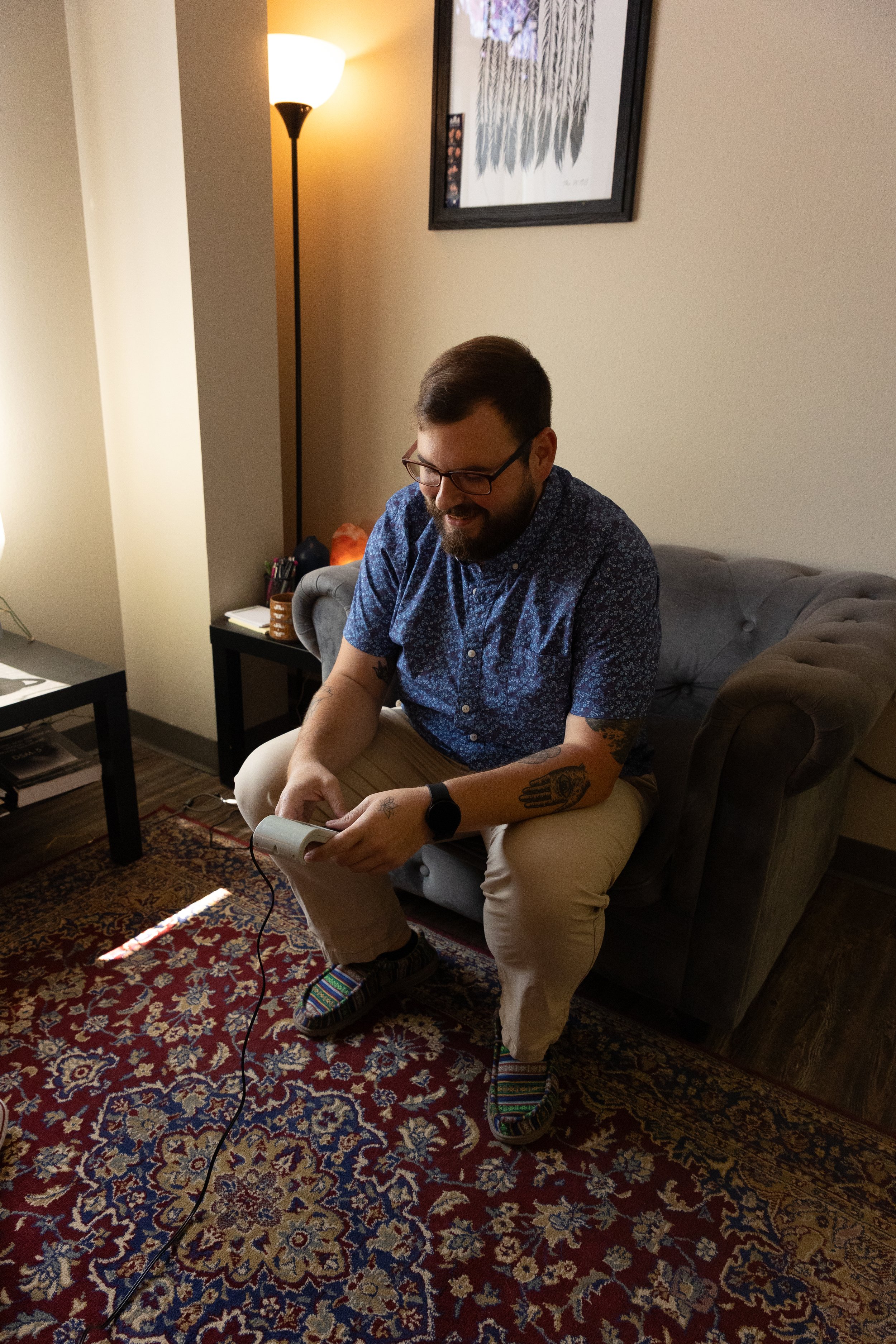
EMDR Therapy
Eye Movement Desensitization and Reprocessing (EMDR) Trauma Therapy
EMDR Therapy
Trauma seems to be
undefinable. As we
struggle to move past difficult experiences,
we can find ourselves
feeling haunted, overwhelmed, and
limited by the anxiety.
You are not alone.
EMDR Therapy can help!
What is EMDR Therapy?
EMDR, short for Eye Movement Desensitization and Reprocessing, is a powerful tool in the arsenal of therapy. Developed by the pioneering Dr. Francine Shapiro, EMDR therapy is rooted in evidence and crafted to guide individuals through the labyrinth of distressing memories and experiences. Drawing from cognitive therapy, exposure therapy, and the innovative use of bilateral eye movement stimulation, EMDR paves the way for profound healing.
How do we know this works? Think about what happens when you have a nightmare. As you’re in REM sleep, your eyes are moving rapidly back and forth and images appear in your memory. Nightmares can be really disturbing and leave us with questions about what our unconscious mind is thinking. With EMDR, we’re recreating the REM sleep cycle in a conscious state so we can reprocessing the memories and let the negative sensations leave our body.
How can EMDR help me?
PTSD isn't just a label reserved for soldiers returning from the battlefield. It's a reality for many who have endured deeply traumatic experiences, whether it's the aftermath of sexual assault, the scars left by abusive relationships, the shock of a car accident, or the weight of witnessing disturbing world events.
Depression, anxiety, panic attacks, and OCD can also cast dark shadows over our lives. Depression can feel like wading through thick mud with no end in sight, while anxiety can create a constant storm of worry and fear. Panic attacks can strike like bolts of lightning, leaving us feeling helpless and out of control. And OCD, with its intrusive thoughts and compulsions, can create a never-ending cycle of anxiety and distress.
But here's the thing – at The Therapy Office, we don't just see diagnoses; we see people. We see individuals who are struggling, who are hurting, and who are searching for a way out of the darkness. That's why we take the time to truly listen, to hear your story, and to understand the depth of your experience.
And then, together, we explore whether EMDR is the right path for you. Because your healing journey deserves personalized care and attention, every step of the way. So if you're ready to take that first step toward healing, we're here to walk alongside you, guiding you toward a brighter, more hopeful future.
Will EMDR actually help me?
So, you've heard about EMDR therapy, and you're thinking, "Could this be the thing that finally helps me?"
Let's talk about it!
First off, if you've been through some tough stuff – whether it was a one-time gut-wrenching event or a series of soul-crushing experiences – EMDR therapy might just be the superhero cape you've been looking for. Our EMDR therapists are here to help you navigate the stormy seas of trauma and come out stronger on the other side.
We aren’t magicians and we aren’t here to promise that EMDR will solve all of your problems. As therapists, we understand that EMDR can be aggressive and scary! Each one of our therapists has experienced EMDR as a client. We know what you are experiencing as you’re reprocessing your trauma and we’re here to help you navigate it.
As we uncover the deep-seeded trauma that you’ve experienced, we’ll connect it with the question: “What does that say about you?” That powerful question will help us untangle what your trauma has made you think of yourself. Once we figure that out, we’re going to use the eye movements to change the narrative, giving you the control that you feel like you’ve been missing in your life.
We aren’t going to sugarcoat it. This won’t be easy. It’s not a magic pill to help you forget your problems. It’s going to give you a new perspective, helping you give the power back to yourself and telling trauma to back off!
After your EMDR sessions, we’ll continue to work with you to instill the new positive beliefs that you have learned about yourself - giving you the support you need to continue healing!
If you’re ready to dive in and experience true peace, we’re here to figure it out with you.
Are you ready for it?
What happens next? When you fill out the Client Interest Form, we get an email. Once we receive it, we’ll get back to you within 48-72 hours and let you know the availability of our therapists and see what therapist is the best fit for you!

“The past affects the present even without our being aware of it.”
— Francine Shapiro
FAQs
-
Each person is different. Depending on the memory that is being reprocessed, it could take several sessions to access the memory and reframe the negative thought patterns. Plan for at least 3-6 sessions to feel the relief and progress that you hear from others who have experienced the therapy.
-
The short answer is no. During the first session, your therapist will take some history to understand your story and background. The first time that you meet for EMDR therapy, your therapist will teach you exercises to help you put away the unfinished business and focus on the things that important in between the trauma processing. After learning those exercises, you’ll dive into reprocessing.
-
Traditional one hour sessions are covered by insurance. If you want to do an intensive EMDR session (3 hours), the session will be available for a cash rate.
-
Trauma processing can be exhausting. After your first EMDR session, we suggest taking the remainder of your day to rest and relax. Your body will continue to reprocess for up to 72 hours after the therapy. The exercises we teach you in the beginning will help you to experience calm in between sessions.
-
No. If you wear contacts or have dry eyes, we suggest wearing your glasses or bringing eye drops for comfort.
-
To get started on your healing journey, fill out our new client form here: New Client Form



